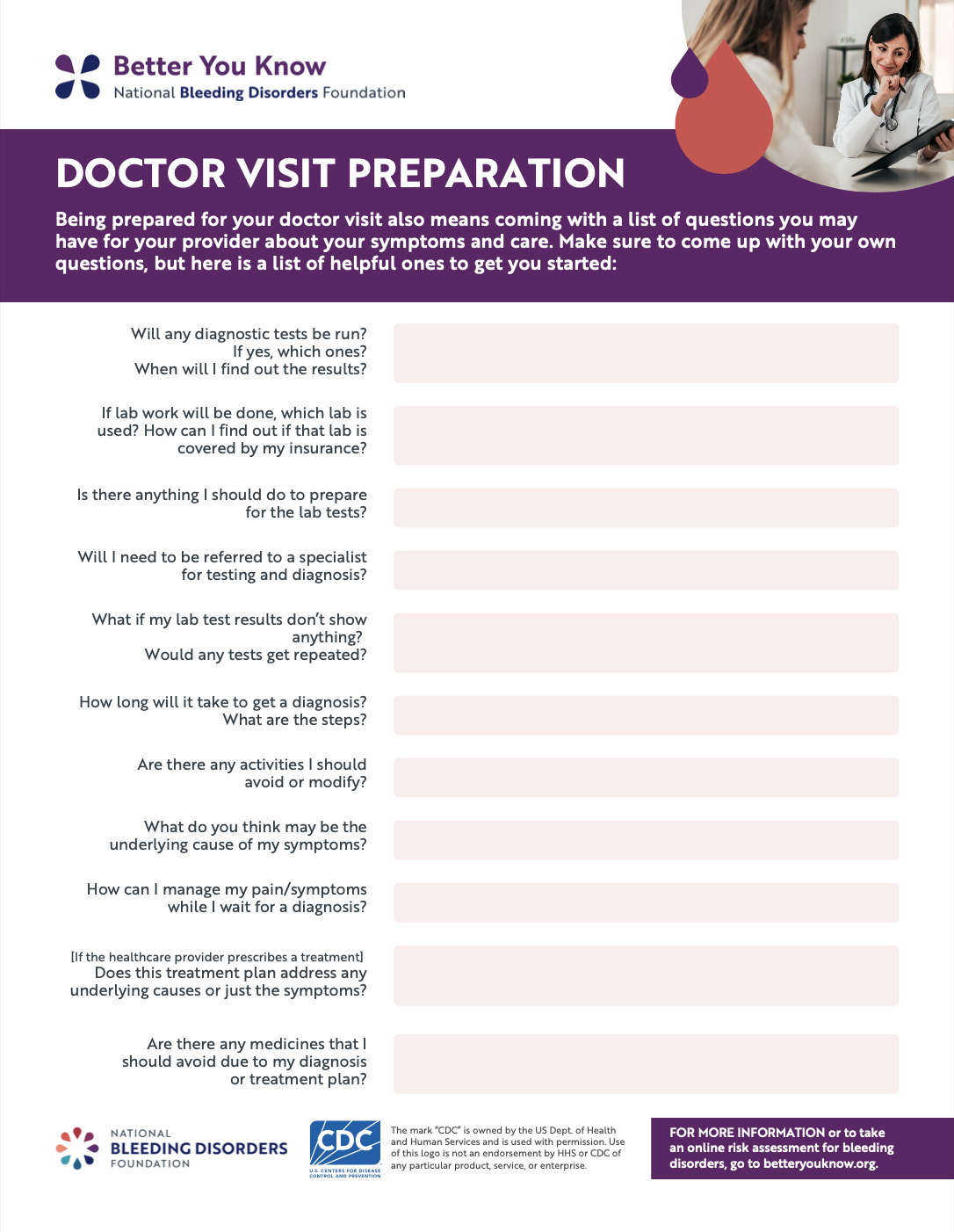Once you have an appointment set up with a provider, it is now time to prepare for that visit, so you get the most out of it. Being open with your healthcare provider can sometimes feel uncomfortable but is crucial for proper diagnosis. Coming prepared can help you feel more comfortable.
What Should I Bring?
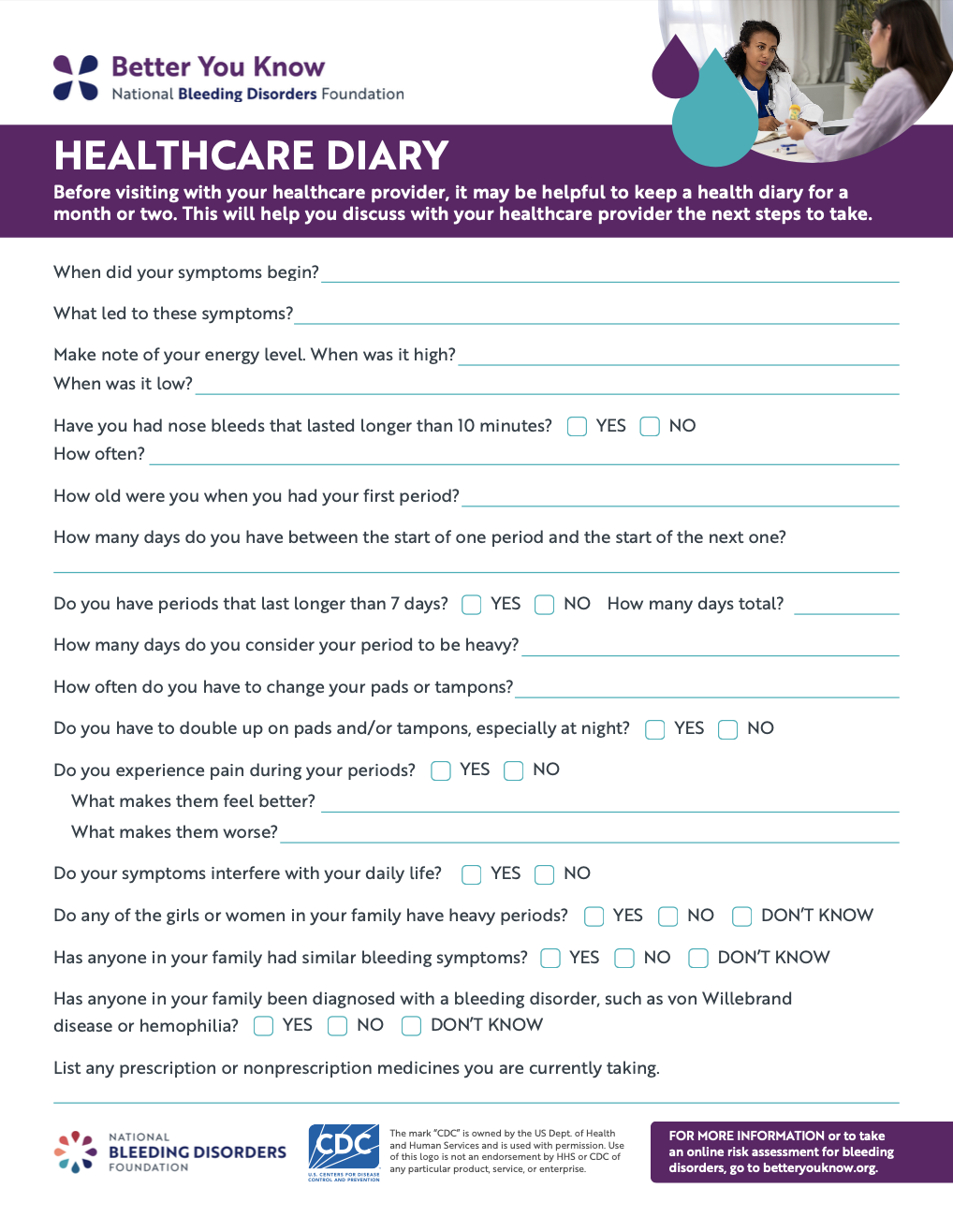 Not all providers will have a lot of experience with bleeding disorders, so consider bringing a print out of your risk assessment, along with your responses to the questions below.
Not all providers will have a lot of experience with bleeding disorders, so consider bringing a print out of your risk assessment, along with your responses to the questions below.
It can be helpful to keep a health diary for a month or two by preparing answers to the questions below before visiting with your healthcare provider. This will help you and your healthcare provider in discussing what steps to take next. You can also print out these questions in this pdf to fill in and bring with you.
- When did your symptoms begin?
- What lead to these symptoms?
- Make note of your energy level. When was it high? When was it low?
- Have you had nose bleeds that lasted longer than 10 minutes? How often?
- How old were you when you had your first period?
- How many days do you have between the start of one period and the start of the next one?
- How many days does your period last?
- How many days do you consider your period to be heavy?
- How often do you have to change your pads or tampons?
- Do you have to double up on pads and/or tampons, especially at night?
- Do you experience pain during your periods? What makes them feel better? What makes them worse?
- Do your symptoms interfere with your daily life?
- Do any of the girls or women in your family have heavy periods?
- Do any of the girls or women in your family have any of the bleeding disorder symptoms listed in the section above?
- Has anyone in your family had similar bleeding symptoms?
- Has anyone in your family been diagnosed with a bleeding disorder, such as von Willebrand disease or hemophilia? Are you taking any prescription or nonprescription medications?
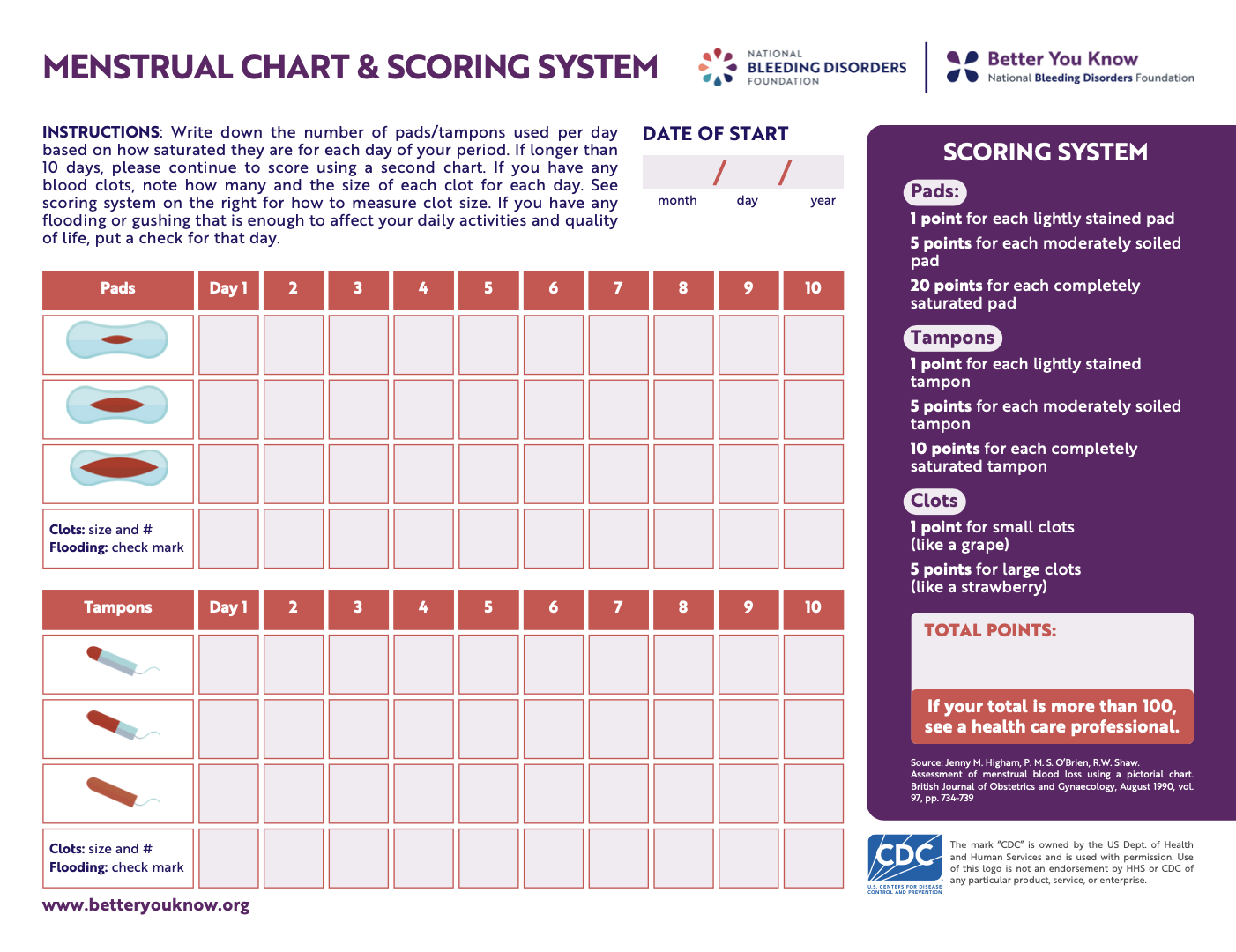 Your healthcare provider may ask you to track your menstrual flow (your period). It’s a good idea to track your flow even before you make that first visit. Tracking can be done easily using the chart below. So fill it out and remember to bring it with you to your medical appointment. The chart contains space for 10 days, but it is best to track for 30 days/1 month so that your healthcare provider can get a better picture of your bleeding. This chart will help you track your periods.
Your healthcare provider may ask you to track your menstrual flow (your period). It’s a good idea to track your flow even before you make that first visit. Tracking can be done easily using the chart below. So fill it out and remember to bring it with you to your medical appointment. The chart contains space for 10 days, but it is best to track for 30 days/1 month so that your healthcare provider can get a better picture of your bleeding. This chart will help you track your periods.
How Can I Better Understand Any Lab Testing?
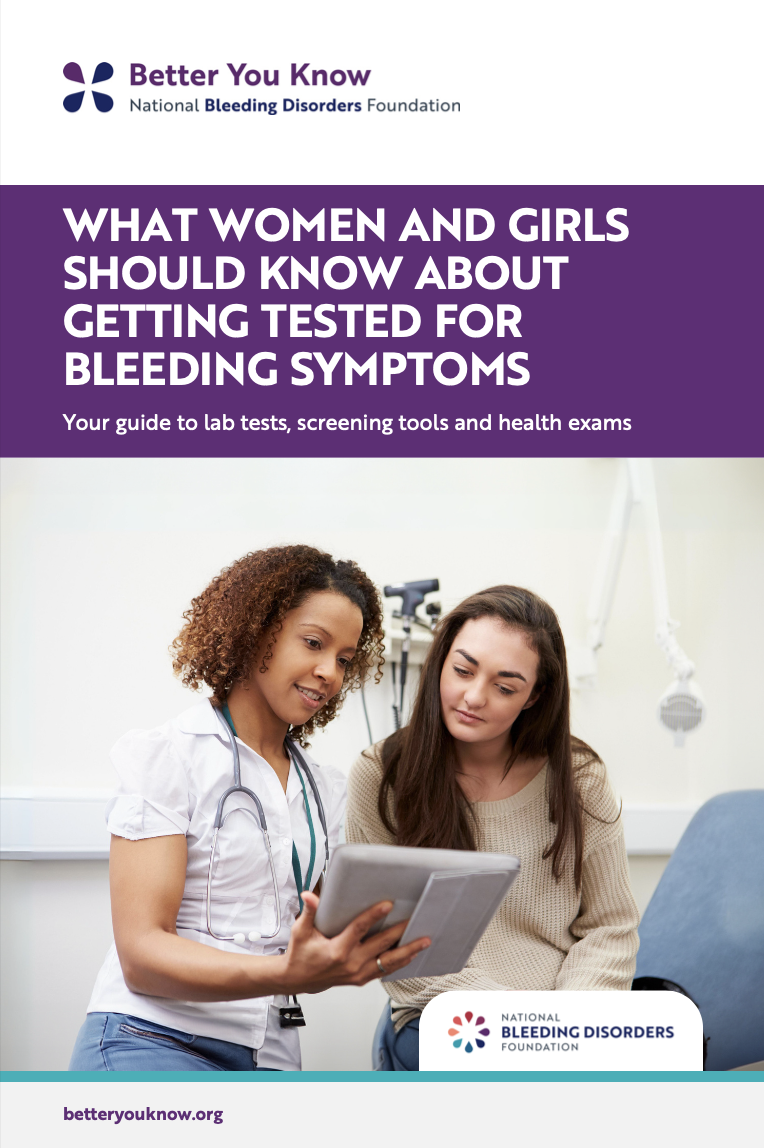 If you are in the process of trying to find out how to explain your bleeding symptoms, your healthcare provider may ask you some questions or run some lab tests to better understand what is going on. If this process feels confusing or overwhelming, you are not alone. NBDF has developed a booklet called What Women and Girls Should Know About Getting Tested for Bleeding Symptoms: Your guide to lab tests, screening tools and health exams, which explains common health tools, called “assessments,” that are used to help understand a person’s current and future state of health. It also gives information on a variety of lab tests that healthcare providers may run to assess for a possible bleeding disorder when a woman or girl is having bleeding symptoms. This booklet also shares things to consider before having the tests.
If you are in the process of trying to find out how to explain your bleeding symptoms, your healthcare provider may ask you some questions or run some lab tests to better understand what is going on. If this process feels confusing or overwhelming, you are not alone. NBDF has developed a booklet called What Women and Girls Should Know About Getting Tested for Bleeding Symptoms: Your guide to lab tests, screening tools and health exams, which explains common health tools, called “assessments,” that are used to help understand a person’s current and future state of health. It also gives information on a variety of lab tests that healthcare providers may run to assess for a possible bleeding disorder when a woman or girl is having bleeding symptoms. This booklet also shares things to consider before having the tests.
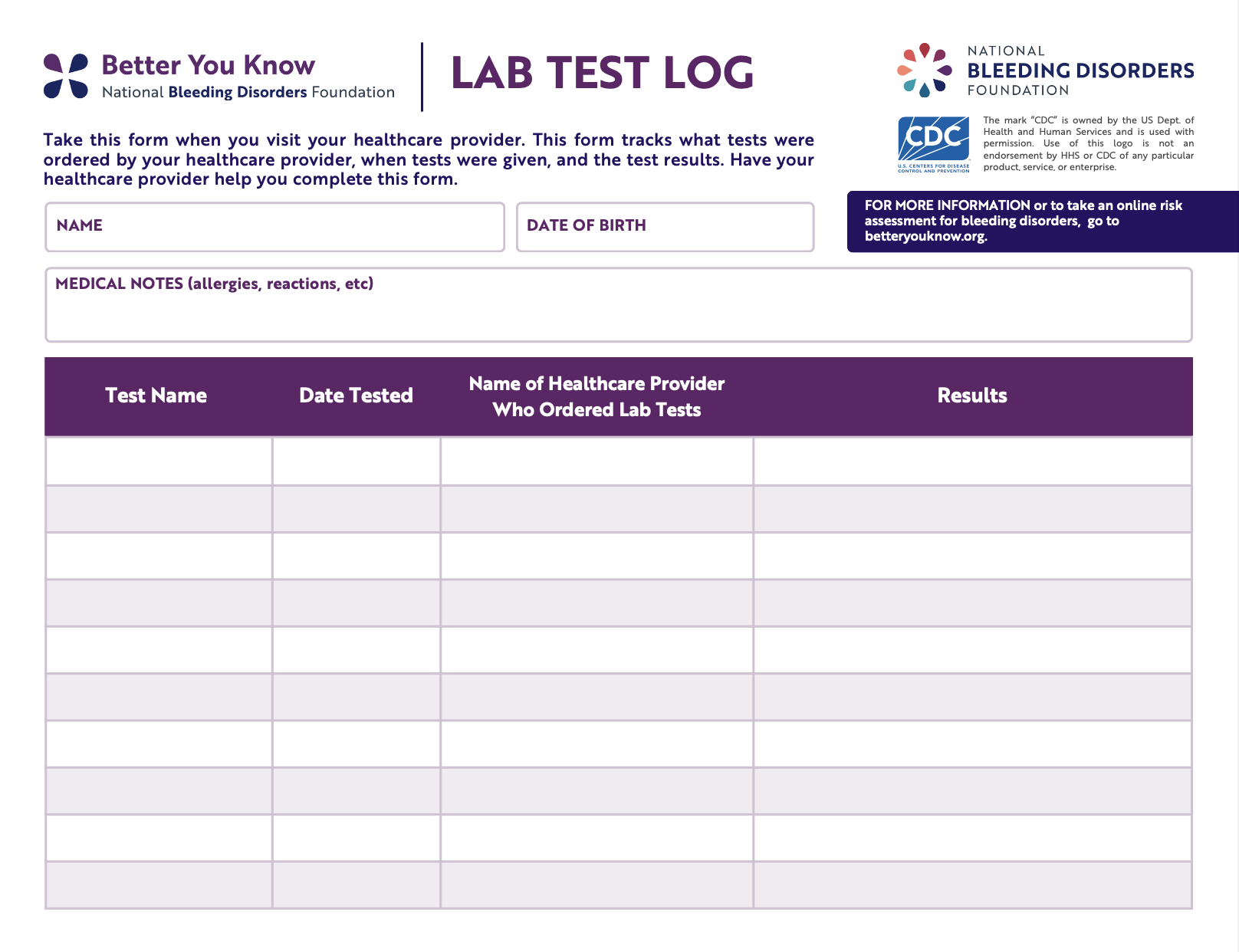 “Tracking any lab tests and the results is another important part of the process to understanding your symptoms. You can use this Lab Test Log to help. Take this form when you visit your healthcare provider. This form tracks what tests were ordered by your healthcare provider, when tests were given, and the test results. Have your healthcare provider help you complete this form.
“Tracking any lab tests and the results is another important part of the process to understanding your symptoms. You can use this Lab Test Log to help. Take this form when you visit your healthcare provider. This form tracks what tests were ordered by your healthcare provider, when tests were given, and the test results. Have your healthcare provider help you complete this form.
What Should I Ask?
Being prepared for your doctor visit also means coming with a list of questions you may have for your provider about your symptoms and care. Make sure to come up with your own questions but here is a list of helpful ones to get you started:
- Will any diagnostic test be run? If yes, which ones? When would I find out the results?
- If lab work will be done, which lab is used? How can I find out it that lab is covered by my insurance?
- How can I manage my pain/symptoms while I wait for a diagnosis?
- Will I need to be referred to a specialist for testing and diagnosis?
- What if my labs don’t show anything?


